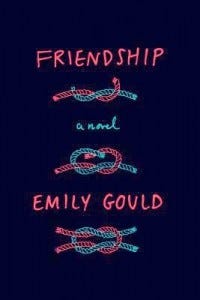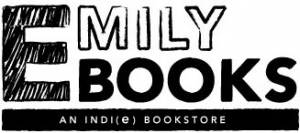interviews
INTERVIEW: Emily Gould, author of Friendship and founder of Emily Books.

Emily Gould is the author of the essay collection And the Heart Says Whatever (Free Press, 2010) and the founder, with Ruth Curry, of the subscription based online bookstore Emily Books. Her debut novel Friendship (FSG, July 1) examines the relationship between longtime friends Amy and Bev, both thirty and trying to establish adult lives for themselves in New York City.
MD: Amy and Bev struggle in the novel with “making it” in New York, both emotionally and financially. How do these struggles define their relationship, and this novel?
EG: My book is about work and relationships because that’s the reality of my life. I’ve had a lot of shitty temp jobs.
The stark realism of shitty temp jobs is something I feel pretty confident about having captured in <em>Friendship</em>.
I also think money is a really good lens for getting right to the heart of someone’s personality, and the characters’ evolving relationships to money are really important to the structure of the book. For example, Amy starts out with a relationship to money where no amount of it would have ever been enough. She wants and needs an infinite amount of money because she’s capable of squandering anything that she’s given, whether that’s money, or opportunities, or someone’s trust or friendship. She’s just a sinkhole for other people’s money, trust, and goodwill. But it’s never enough. Nothing can ever fill her up.
Amy starts to change a little bit by the end of the book, but she didn’t quite change quickly enough. At one point in the book she assumes that if she just waits, adulthood will come for her, like a bus. But of course it’s not something that happens to you. It’s a series of decisions that you make, incremental, tiny, boring decisions that you make in your life day after day after day. That’s how you become an adult. It sounds awesome, right? But the reward is obviously that you get to have true freedom. But it is boring. You have to put your nose up against your worst qualities and stare deeply into them. It’s a lot like writing in that way.

MD: “Into the Woods” talks about the work of being a writer and your own financial situation after your first book sold. Why was this important for you to write about?
EG: A few years ago, I wrote on my blog that the advice “do what you love and the money will follow” is so idiotic. Sometimes it’s more interesting and better for you as a human being to do what you hate, or at least something that you aren’t totally crazy about. I became a better writer by working, and by having stuff required of me that’s not in my comfort zone — my comfort zone obviously being alone in my room with a computer. It has enabled me to write about aspects of life that would have been hard for me to just imagine.
The finances are important, too. If you want to spend enough time living in your brain and writing, actually doing the work of being a writer, it’s impossible to have any kind of high-paying fulltime job. I’m not counting teaching. Teaching is a hard, draining, low-paying job. The idea that that you will teach and still have enough of you left to also write books, and have a decent middle class lifestyle — this is becoming not sustainable for a lot of people.
I’m not trying to discourage anyone from writing. But what I am trying to discourage people from doing is Being A Writer, capital B, capital A, capital W, and just thinking that that’s going to be it. Working and then writing and then working and then writing is going to be what I do for the rest of my life, and I know that now. I don’t think I was stupid to not know that before. I think I was a little blinkered. If you want to be a self-supporting adult and also be a writer, you’re going to have to think hard about what your five-year plan is, and what your ten-year plan is. The reality is that sometimes you’re not going to be a writer. You’re going to be the sales director for a startup that makes magazine apps, which is what I’m doing right now.

MD: You also have a third job, running Emily Books. Why did you start the bookstore?
EG: My goal for the past few years has been to interpret this kind of shaky time in publishing where a lot of things are changing rapidly as an opportunity for positive change and innovation. A lot of publishing executives who have been in this business for 30 years really wish that we could build a time machine. That would be the innovation that they would be most interested in seeing — a time machine that took us back to the late 90s, or maybe earlier.
Publishing houses should be marshaling all of their resources to figure out ways to harness the startup energy that’s in NYC right now and use it on behalf of publishing.
There are really smart people who are working on the problem of how to get words in front of the people who want to read those words, but none of them are working at major publishing houses. That’s not as it should be.
This is part of the reason why we wanted to experiment with a different distribution model. I don’t think the subscription model is the one answer, but it’s something cool to experiment with. Not everyone has access to what we take for granted in New York, which are these amazing independent bookstores. I can go into either McNally Jackson or into Word in Brooklyn or Jersey City and there will be someone there who I know, and have had a relationship with for years and years, who can tell me exactly what I should be reading next. Emily Books subscribers in America don’t really live in big coastal cities, and I think they are attracted to subscribing because they have someone say every month, “This is the book you should be reading now.” That’s really valuable, and it’s kind of a luxury. It’s not something you can really get from an algorithm. There needs to be digital alternatives to hand selling, not to supplant hand selling, but to give people who don’t live in a community with an independent bookstore access to it.
MD: What’s on the horizon for Emily Books?
EG: Now that we’re almost in our third year we’re moving away from just being a book club and bookstore with a subscription model that sometimes inadvertently publishes books because it republishes books that have fallen out of print, toward eventually publishing original books. That will happen conservatively within the next two years. We’re taking the initial steps right now that will make it possible for us to not only edit and publish and distribute and market original titles, but also to sell and distribute print editions of every book that we sell, which is a huge financial undertaking. We’re just at the beginning of understanding how massive that will actually be.
Ruth and I would like for Emily Books to eventually be at least one of our full time jobs. It seems like a very lofty goal from where I’m sitting right now, but I think that we can do it. It does seem like a tilting at windmills things. In the past I had the thought that I would be a yoga teacher as my day job, and use my yoga teaching money to support my writing. This isn’t as stupid, but it’s still, “Oh I will use my money from independently publishing feminist books to support my writing.” I don’t know. We’ll see how that goes. We do have a built-in audience because we have a subscriber base, so it won’t be as hard as starting from scratch, so that’s good.
MD: Thus far, Emily Books sells only e-books. Your books are different from other e-books though because they don’t include Digital Rights Management. Why don’t you use DRM on your books?
EG:
I think DRM is a tool that Amazon uses to control the literary marketplace, and I don’t agree with the idea that piracy is even a real problem.
I think it’s a straw man. We’re aware of the extreme rarity of our DRM-free e-books actually being pirated.
Piracy has been trumped up to distract people from the real issue, which is all the ways that e-books are treated as not real books, or treated differently as other books. At Emily Books, we encourage people to share our books with their friends. We only allow a certain number of downloads, but if you want to share your e-book with a friend the way that you would obviously easily share a print book with a friend, there’s nothing wrong with that. People should feel free to do that. You shouldn’t be licensing a copy of a digital file when you buy a book. You should be buying a book. It should be yours. You should be able to own that book and do whatever you do with an ordinary book. The only reason that it’s not is that the marketplace has evolved in a strange, artificially curtailed way because of Amazon’s total dominance of the e-book market.
MD: Given your strong support of independent publishing, and your feelings about DRM, were you conflicted about publishing your novel with FSG, a large publishing house that requires DRM on all its e-books?
EG: A little bit. I did think about that. But I think that, for the moment at least, a publisher like FSG still brings a lot of advantages. I felt that my book would be published better: better cover, better distribution, better review coverage, better placement at stores, and on Amazon. They have a better relationship with Amazon than something like Melville House or Two Dollar Radio does. And I want people to read my book. I want people to buy it.
One of the reasons I initially shied away from making Emily Books into a publisher rather than a bookstore is because I realized I couldn’t offer a writer the stuff that I would want from a publisher. And it wouldn’t be fair to publish books until I knew that I could provide those things. That’s one of the reasons why our progress has been so slow. There are a lot of publishers that have the first and most important piece of being a publisher, which is that they have great taste and the books that they publish are quite good. But without all of that other infrastructure stuff, it’s not ideal for writers Being published but just barely, or being published badly — it’s not bad for your career, but it’s not what best for your career. At least as things stand right now. My ambition is to become a great independent publisher. There certainly are great independent publishers.
We’ve seen huge successes from places like Graywolf Press and Coffee House Press over the years, but you have to really work at the more unglamorous parts of being a publisher, which are marketing and sales and distribution. Those things are just as important as editorial.
Yikes. I can’t believe I’m saying that. But from my perspective as an author, I think that’s true. From my perspective as a publisher, I’m thinking, “Oh my god, no. What could be more important than editorial?” But you know, whether you are being published by a small or big press, basing your decision on the editor who’s acquiring your book or whether you think that your book is going to be acquired by someone who really gets you and gets the book — that should be secondary to every other concern that you have about how your book will be published. Because editors leave. Everyone leaves. Publishing houses are very fungible environments, especially right now.









